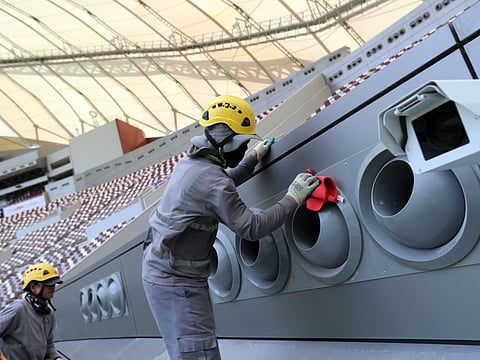Migrant workers building World Cup facilities unpaid for months in Qatar
Amnesty International leads call for compensation and reform of exploitative labour systems

Doha: A new investigation by Amnesty International has exposed how an engineering company involved in building 2022 Fifa World Cup infrastructure took advantage of Qatar’s notorious sponsorship system to exploit scores of migrant workers.
The company, Mercury MENA, failed to pay its workers thousands of dollars in back wages and work benefits, leaving them stranded and penniless in Qatar.
The organisation is calling on the Qatari government to ensure that former employees of Mercury MENA receive the money they earned, and to fundamentally reform the "kafala" sponsorship system that has allowed numerous companies to exploit migrant workers, as documented by Amnesty International and others since 2013.
“In 2017, the Qatari government was applauded after announcing a programme of labour reforms. But even as this agreement was being signed, scores of Mercury MENA employees were stranded without pay in squalid accommodation, wondering where their next meal would come from and if they’d ever be able to return home to their families,” said Steve Cockburn, director of Global Issues at Amnesty International.
“Many Mercury MENA employees had made huge sacrifices and taken out ruinous loans to take jobs in Qatar. They ended up working unpaid for months on end and were let down by a system which failed to protect them.
"By ensuring they get the wages which they are owed, Qatar can help these migrant workers to rebuild their lives and show that it is serious about improving workers’ rights.”
Between October 2017 and April 2018, Amnesty International interviewed 78 former Mercury MENA employees from India, Nepal and the Philippines, who are owed huge sums by the company.
In Nepal, Amnesty International interviewed 34 people who are owed, on average, $2,035 (Dh7,470) each.
Mercury MENA was formerly known as Mercury Middle East, and had played an important part in constructing a showcase stadium central to Qatar’s winning presentation to FIFA in December 2010.
Since then, migrant workers employed by the company worked on some of Qatar’s most prestigious projects, including the ‘Future City’ of Lusail which will host the opening and closing games of the World Cup, Others worked on the Barwa Al Baraha workers’ accommodation complex — ironically promoted by Qatar as a sign of improving conditions for migrant workers.
Persistent failure to pay wages
The organisation’s research found that there were delays with Mercury MENA paying salaries from about February 2016 onwards, and that delays became more persistent and unresolved in 2017.
The company also failed to provide legally required residence permits to workers, which led to fines that placed additional restrictions on their ability to move jobs or leave the country. In at least one case, the company refused a workers’ request to return home by denying him an ‘exit permit’.
Under Qatar’s sponsorship system, companies have had the power to prevent workers from leaving the country or changing jobs, limiting their options to escape abuse or challenge their treatment. The ‘exit permit’ requirement was removed for most workers in September 2018.
Ernesto, from the Philippines, worked as a piping foreman for Mercury MENA in Lusail City, a $45 billion (Dh165 billion) project.
When he left Qatar after two years, he was owed four months of wages and in greater debt than when he arrived.
“I’m imagining things during [the World Cup] ... People from all over the world cheering, laughing, touring some of the beautiful stadiums, recreational sites and hotels here. Will they ever think ‘what are the stories behind those structures?,’” Ernesto asked Amnesty International.
Compensation
Despite the promise of major reforms in 2017, and the abolition of the exit permit for most migrant workers early this month, Qatar’s labour laws still do not comply with international standards. Employers can still prevent workers from changing jobs in Qatar, sometimes for up to five years.
Workers who change jobs without the permission of their employers are accused of “absconding”, a criminal charge leading to possible detention and deportation.
Promised reforms to create a fund for workers in difficulty, and to set a new minimum wage, are expected in the future.
Amnesty International is calling on the Nepal and Qatar governments to support the former Mercury MENA workers to get justice and receive the money that they are owed, and to take steps to prevent similar cases from arising in the future.
“Sadly, the exploitation of migrant workers by Mercury MENA is not an isolated case. We will continue to pressure the Qatar authorities until promises of overhauling the sponsorship system are delivered, and workers’ rights are fully protected both in law and practice,” said Steve Cockburn.
Mercury MENA’s response
In November 2017, Amnesty International spoke to the CEO of Mercury MENA, who acknowledged long-standing pay delays but denied exploiting workers.
He said that Mercury MENA had been the victim of unscrupulous business partners resulting in “cash flow problems” and a number of disputes over payments with contractors and clients.
Documented communications between Mercury MENA and its workers show that the company’s management were fully aware of the problems with salary payments, and continued to make promises to pay wages that were ultimately not kept.



